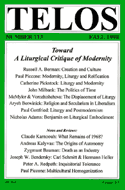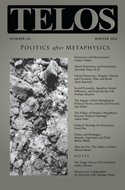By Telos Press · Tuesday, December 14, 2021 In today’s episode of the Telos Press Podcast, David Pan talks with Linus Recht about his article “After Desire: Foucault’s Ethical Critique of Psychological Man and the Foucauldian Ethos of the Internet Age,” from Telos 196 (Fall 2021). An excerpt of the article appears here. In their conversation they discussed Foucault’s critique of the psychological self and his search for a form of selfhood that would allow for continual reinvention and the discovery of new pleasures; how a reading of Platonic psychology demonstrates the weakness of Foucault’s critique of the psychological self as a historical construct; how contemporary social media has translated Foucault’s ethics of the self into reality; and how the ubiquity of mobile phones and similar devices in our everyday life, particularly the way that they subject us to a constant stream of distracting stimuli, suggests that Foucault’s notion of what the self could be might actually be a recipe for misery. If your university has an online subscription to Telos, you can read the full article at the Telos Online website. For non-subscribers, learn how your university can begin a subscription to Telos at our library recommendation page. Print copies of Telos 196 are available for purchase in our online store.
Listen to the podcast here.
Continue reading →
By Telos Press · Thursday, December 9, 2021 In today’s episode of the Telos Press Podcast, David Pan talks with Nir Evron about his article “Hannah Arendt, Thinking, Metaphor,” from Telos 196 (Fall 2021). An excerpt of the article appears here. In their conversation they discussed how Arendt understands the difference between a metaphorical and a literal view of the world; her view of metaphor as a bridge between the thinking ego and the social and political world that it inhabits; the tension in Arendt’s The Life of the Mind between her desire to move beyond metaphysical assumptions and her unwillingness to let go of the philosophical tradition; the consequences for morality of her conception of metaphor; the impact of the Eichmann trial on Arendt and how it prompted her to explore the connection between thoughtlessness and evil; and her belief that the individual’s ability to think in a critical fashion might serve as a check on the descent into totalitarianism. If your university has an online subscription to Telos, you can read the full article at the Telos Online website. For non-subscribers, learn how your university can begin a subscription to Telos at our library recommendation page. Print copies of Telos 196 are available for purchase in our online store.
Listen to the podcast here.
Continue reading →
By Telos Press · Tuesday, December 22, 2020 In today’s episode of the Telos Press Podcast, Camelia Raghinaru talks with Aryeh Botwinick about his article “Epistemological Skepticism, Textual Skepticism, and the Role of Constitutions,” from Telos 189 (Winter 2019). An excerpt of the article appears here. If your university has an online subscription to Telos, you can read the full article at the Telos Online website. For non-subscribers, learn how your university can begin a subscription to Telos at our library recommendation page. Purchase a print copy of Telos 189 in our online store.
Listen to the podcast here.
Continue reading →
By Mark W. Roche · Wednesday, September 27, 2017 American academics have much to lament about President Trump: his break with civility, his vilification of Mexicans and Muslims, his indifference to truth and to conflicts of interest, his hostility to science, his devaluation of diplomacy. Directly on campuses we recognize the vulnerability of undocumented students and dwindling numbers of international students. As a result, many faculty members and administrators have responded harshly to his presidency.
Yet President Trump retains the enthusiastic support of his base. This support stems to some degree from his courage, which contrasts so prominently with normal party politicians. Trump is a fighter who speaks his mind without constraint, mocking political correctness, challenging the Washington establishment, threatening North Korea, and pulling no punches even against allies. Trump himself has elevated this virtue. His campaign posters announced: “It’s easy to stand with the crowd; it takes courage to stand alone!”
But Trump is the opposite of courageous if one has any meaningful concept of this intellectual virtue.
Continue reading →
By Kyle Nicholas · Monday, June 22, 2015  Catherine Pickstock’s “Liturgy and Modernity,” from Telos 113 (Fall 1998), is an effort to find an alternative to liberal individualism and social fragmentation in modernity. Pickstock finds this alternative in liturgy: a liturgical critique of modernity where “liturgy” functions as a thoroughly political category. Liturgy is specially equipped to confront modernity due to its nature as ritual behavior (and therefore universal among humans). Yet the liturgical is to be favored over “ritual” for two reasons. First, ritual has already been relegated to its own “delimited sphere” in modernity, where it is viewed as a private superstructural category. Furthermore, ritual in the modern mind is regarded merely as “mechanical repetitions divorced from any informing narrative.” Liturgy, on the other hand, responds to the former challenge by its nature as “a pattern of social action” (not a delimited sphere) and responds to the latter by its foundation in a “privileged transcendent signifier.” Catherine Pickstock’s “Liturgy and Modernity,” from Telos 113 (Fall 1998), is an effort to find an alternative to liberal individualism and social fragmentation in modernity. Pickstock finds this alternative in liturgy: a liturgical critique of modernity where “liturgy” functions as a thoroughly political category. Liturgy is specially equipped to confront modernity due to its nature as ritual behavior (and therefore universal among humans). Yet the liturgical is to be favored over “ritual” for two reasons. First, ritual has already been relegated to its own “delimited sphere” in modernity, where it is viewed as a private superstructural category. Furthermore, ritual in the modern mind is regarded merely as “mechanical repetitions divorced from any informing narrative.” Liturgy, on the other hand, responds to the former challenge by its nature as “a pattern of social action” (not a delimited sphere) and responds to the latter by its foundation in a “privileged transcendent signifier.”
Continue reading →
By Michael Marder · Wednesday, February 13, 2013 Michael Marder’s “After the Fire: The Politics of Ashes” appears in Telos 161 (Winter 2012). Read the full version online at the Telos Online website, or purchase a print copy of the issue in our store.
 Two fires are kindled at the threshold of the metaphysical era, and both are extinguished, almost simultaneously, as soon as metaphysics exhausts itself (or else gets exhausted, tired, fatigued with itself) in its final Nietzschean inversion. The political reality of the twenty-first century is, as a whole, a comet tail of these ancient blazes that, until recently, seemed to be older than time itself, gave the impression of being eternal, undying, inextinguishable. How to find one’s bearings among the cinders and ashes of what the flames consumed? How to make sense—if make sense we must—of the burnt and smoldering remains, the traces of catastrophes, as much as of hopes and revolutionary desires, littering the horizons of the political today? Two fires are kindled at the threshold of the metaphysical era, and both are extinguished, almost simultaneously, as soon as metaphysics exhausts itself (or else gets exhausted, tired, fatigued with itself) in its final Nietzschean inversion. The political reality of the twenty-first century is, as a whole, a comet tail of these ancient blazes that, until recently, seemed to be older than time itself, gave the impression of being eternal, undying, inextinguishable. How to find one’s bearings among the cinders and ashes of what the flames consumed? How to make sense—if make sense we must—of the burnt and smoldering remains, the traces of catastrophes, as much as of hopes and revolutionary desires, littering the horizons of the political today?
Continue reading →
|
|
 Catherine Pickstock’s “Liturgy and Modernity,” from Telos 113 (Fall 1998), is an effort to find an alternative to liberal individualism and social fragmentation in modernity. Pickstock finds this alternative in liturgy: a liturgical critique of modernity where “liturgy” functions as a thoroughly political category. Liturgy is specially equipped to confront modernity due to its nature as ritual behavior (and therefore universal among humans). Yet the liturgical is to be favored over “ritual” for two reasons. First, ritual has already been relegated to its own “delimited sphere” in modernity, where it is viewed as a private superstructural category. Furthermore, ritual in the modern mind is regarded merely as “mechanical repetitions divorced from any informing narrative.” Liturgy, on the other hand, responds to the former challenge by its nature as “a pattern of social action” (not a delimited sphere) and responds to the latter by its foundation in a “privileged transcendent signifier.”
Catherine Pickstock’s “Liturgy and Modernity,” from Telos 113 (Fall 1998), is an effort to find an alternative to liberal individualism and social fragmentation in modernity. Pickstock finds this alternative in liturgy: a liturgical critique of modernity where “liturgy” functions as a thoroughly political category. Liturgy is specially equipped to confront modernity due to its nature as ritual behavior (and therefore universal among humans). Yet the liturgical is to be favored over “ritual” for two reasons. First, ritual has already been relegated to its own “delimited sphere” in modernity, where it is viewed as a private superstructural category. Furthermore, ritual in the modern mind is regarded merely as “mechanical repetitions divorced from any informing narrative.” Liturgy, on the other hand, responds to the former challenge by its nature as “a pattern of social action” (not a delimited sphere) and responds to the latter by its foundation in a “privileged transcendent signifier.”  Two fires are kindled at the threshold of the metaphysical era, and both are extinguished, almost simultaneously, as soon as metaphysics exhausts itself (or else gets exhausted, tired, fatigued with itself) in its final Nietzschean inversion. The political reality of the twenty-first century is, as a whole, a comet tail of these ancient blazes that, until recently, seemed to be older than time itself, gave the impression of being eternal, undying, inextinguishable. How to find one’s bearings among the cinders and ashes of what the flames consumed? How to make sense—if make sense we must—of the burnt and smoldering remains, the traces of catastrophes, as much as of hopes and revolutionary desires, littering the horizons of the political today?
Two fires are kindled at the threshold of the metaphysical era, and both are extinguished, almost simultaneously, as soon as metaphysics exhausts itself (or else gets exhausted, tired, fatigued with itself) in its final Nietzschean inversion. The political reality of the twenty-first century is, as a whole, a comet tail of these ancient blazes that, until recently, seemed to be older than time itself, gave the impression of being eternal, undying, inextinguishable. How to find one’s bearings among the cinders and ashes of what the flames consumed? How to make sense—if make sense we must—of the burnt and smoldering remains, the traces of catastrophes, as much as of hopes and revolutionary desires, littering the horizons of the political today? 






